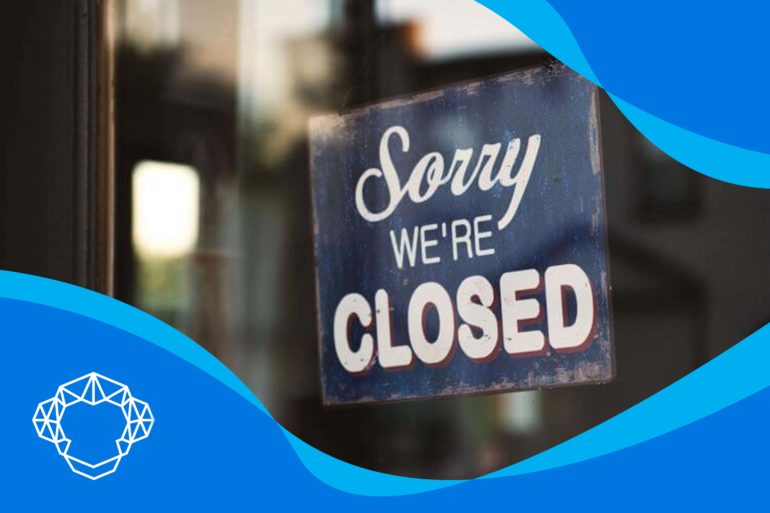Everyone likes to hear a good success story. Still, it is equally essential to know why do small businesses fail because it is always better to learn from someone else’s mistakes. Whether you’re thinking about starting a company, or you’re already running one, you should be aware of some common mistakes that often lead to failure.
Of course, when starting something new and hoping for success, no one likes to talk about that worst-case scenario, or “what if.” However, that is not something you should avoid. Thinking about all the reasons that could lead to a potential disaster could help you prevent that from happening. Failing at something is pretty easy, much easier than becoming successful, which is why you have to know why do most small businesses fail. The road to failure is paved with bad advice, ignorance, poor planning, and bad strategies, so stay tuned to find out the most common mistakes business owners make, also known as reasons why small businesses fail.
Why Do Most Small Businesses Fail?
Today we focus on smaller business ventures, but some of these causes could be valid for many other different types of businesses. The thing is there are so many things that can go wrong, and unless you’re dedicated, mistakes can occur when you least expect them. Maybe you don’t know how does a small business pay taxes or you have a high-risk merchant account. Perhaps the timing was wrong, or you jumped into something completely unknown, and now you’re drowning. It is all a part of a learning process, and as long as you don’t give up, you’re only increasing your chances for a successful story to happen.
What Could Cause Your Business to Fail?
Did you pick a wrong merchant processing company or a pricey e-commerce payment option? Do you know how to read the merchant statement, or you’re overpaying credit card processing? Was your financial plan full of miscalculations? You jumped into something you don’t really know a lot about? If you just found out the best small business ideas and you’re inspired to try one of them, keep in mind why small businesses fail and how to avoid those mistakes if you want to expand a business. We curated a list of some common causes and a few tips on preventing such situations, so let’s take a look together.

Why Do Many Small Businesses Fail and How Do You Overcome It?
Are you wondering what are the top 5 reasons businesses fail? We’ll give you five causes and solutions because you can never be cautious enough when investing your time and money into something. However, you have to be aware that sometimes it is not up to you. Things can go wrong for numerous reasons, and you can’t control the circumstances or bad timing. Besides focusing on the negative, you should strive to learn from those mistakes and not give up so easily. You can always try again and avoid a small business failure if you’re better prepared.

#1. Poor Planning Is One of the Main Reasons Why Business Fail
Every idea seems simple while it is in our head, especially if you’re just starting your entrepreneurial journey, and you never ran a smaller company before. It is easy to start daydreaming and get seduced by easy cash, but the reality is, you have no idea what you’re putting yourself into. And we are not talking just about the things that might sound totally confusing, such as visa access fee, early termination fee, credit card factoring, or PCI compliance.
You need to thoroughly research your field of interest, make a target group, check out what’s on the market, research your competition, see what their pros and cons are, and figure out how to stand out. The truth is, it’s hard to be totally original these days and come up with something never seen before, and that’s ok, but you can’t completely copy someone else’s model and hope that no one notices it.
How to Prevent a Failure With Proper Planning
All good things take time, which is why you should not rush with starting your venture. Proper planning can last for months because you have to cover so many details. Whether you’re working alone or you have a partner, consider talking with a financial advisor to get an idea of how much this can actually cost and how long you’ll have to wait to return the investment and start making a profit. You should have a detailed strategy for the first few months and a financial plan. Only when you take a look at that, you can tell whether or not this is something doable.

#2. Not Understanding What Your Target Group of Customers Wants
This is also extremely important. You maybe have a great idea, and you think you know exactly who your target audience is, but if you don’t know how to approach them, you’re not going to sell anything. Today, some things just sell better online. Some people only pay with credit cards. If you don’t offer credit card processing, they will walk out. So, you have to get to know your target audience well. Are they teenagers, young professionals, or seniors?
You’re maybe not a fan of PayPal alternatives such as Apple pay, but if your customers are not into carrying cash around, there’s no such cash discount program that could help you win them over. You have to follow the trends and offer your customers a convenient shopping experience. Online is not always the best solution, so you should really take a lot of things into consideration before jumping into this.
How to Give Your Clients Exactly What They Want?
Before you can provide them with what they want, you have to know what they want. And how are you going to figure out that? You can ask around, ask your friends and family for their honest opinion, but the best way is to go to your competition’s online pages and check comments, reviews, and general feedback. That way, you can get a genuine opinion from you potential buyers about what they want or don’t, and then base your strategy upon it.

#3. Poorly Managed Inventory
This is another common problem, whether you’re opening a smaller brick-and-mortar shop or an online store with the help of some Shopify alternatives. Unless you’re offering only one product or service, you can’t really know what’s going to be a hit among your clients. But even then, if you have one product, you can’t tell how much supplies you should have. Will it all sell out overnight, or you won’t sell a single thing for a month?
If you deny a few customers by saying you’re out of stock, and you can’t have what they need by tomorrow, the truth is they probably won’t come back. This is especially tricky for things that have a short expiration date. So you really need a plan on how to always have enough, but not too much. You need inventory management.
How to Notice a Sales Pattern
To have your inventory properly supplied, you need to get to know and understand your sales pattern. It might take a while to notice them, for example, a month or two, but after that, you should not have problems with running out of stock suddenly. You can use special software for inventory management or get a POS system that can track inventory and give you a report. Based on that, you could figure out what are your top-selling items, and not so popular ones.

#4. Lack of Sales Is Something That Every Business Struggles With Sooner or Later
For new entrepreneurs, lack of sales is usually the biggest concern. But the lack of sales is not only a problem at the beginning. Sometimes, if the marketing part is done correctly, you’ll get a lot of new customers who will be interested in your products or services at the beginning. But if you don’t know how to keep them coming back for more, it will become hard to maintain the same sales level sooner or later.
Also, if you’re offering something seasonal, that could be a problem if you don’t have an alternative to offer during the off-season. For example, your products are made specifically for use during the summer or winter months. Once your season goes by, your stuff is inadequate, and you’ll experience a significant lack of sales that many smaller businesses can’t survive in their first year.
How to Keep Selling Year Round
To keep your customers coming back, you have to think in advance and prepare for those times when your primary products or services won’t be in high demand. So you either need a new strategy, a theme, something related to the current season, holidays, that will keep your business running. Make discounts, giveaways, special offers, invest in advertising, and always have a backup plan.

#5. Trying to Do Too Much at the Beginning
It is always good to be ambitious and dream big, but you should keep in mind that every beginning is hard and that it might take more than you expected to start making some serious money. Many entrepreneurs like to think big, and they have big plans, big launches, openings, offering tons of products, and more. But the truth is, if you don’t have an established base of loyal customers, it is going to be one rough start.
You should have a plan that includes growth over time, expanding and hiring more people. But don’t start with it until you feel the pulse of your customers and get their feedback. That could completely change the direction your brand is going and give you some fresh ideas. Also, you should focus on a certain niche. You can’t do it all and try to present yourself like an expert in several fields.
Small Ideas, Big Future
Why does a small business fail? Because it wants to take shortcuts and grow faster. Patience is the key in this case. Before you invest every cent into a too ambitious project, how about you take a trial period and test how everything works on a smaller scale for two or three months. See what goes the best and focus on that, and then with time, you can expand if there’s room.

Now You Know Why Do Small Businesses Fail
We can’t hide that many smaller entrepreneurial projects don’t survive the first year of their existence. But we also can’t help to notice that many of them fail due to a blunder. These are all common mistakes that could be avoided easily if you invest a bit more time planning and making financial plans than into daydreaming. Things such as financial consulting, mobile notary, and other merchant services can be convenient for a beginner who needs every help possible. And that is our last tip: always ask for help. Entrepreneurs always think they can do everything on their own – handle sales, finances, marketing, etc. But the truth is that a reliable merchant processing company that offers the best rates and professional support is a must for every merchant looking to prosper.







